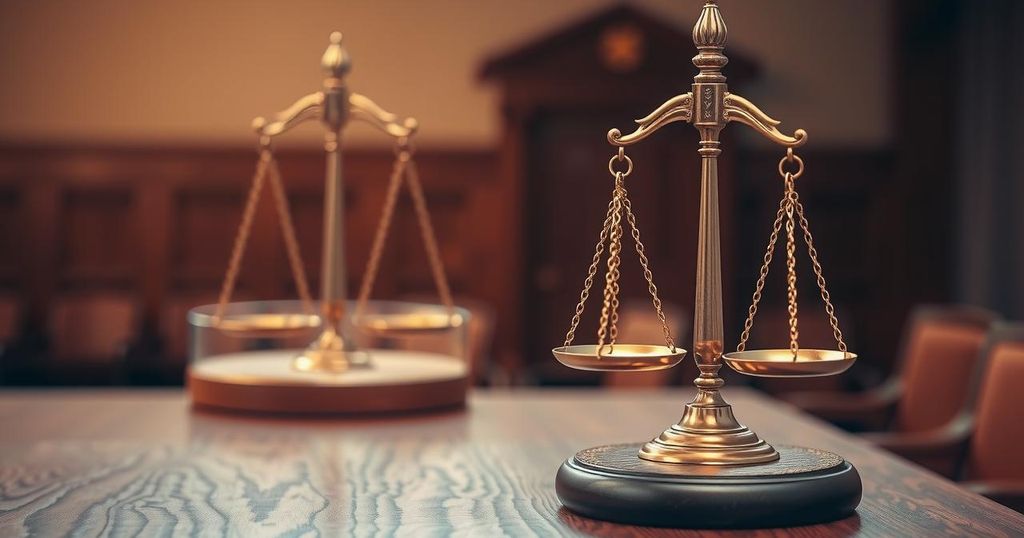Liberia’s Supreme Court, led by Chief Justice Sie-A-Nyene Gyapay Yuoh, faces a pivotal moment amid a political crisis and ambiguous rulings regarding the House leadership standoff. Speaker J. Fonati Koffa is challenging the Majority Bloc’s legitimacy, resulting in increased public scrutiny of the judiciary. As Yuoh approaches retirement, her legacy hangs in the balance, contingent upon the Court’s forthcoming decisions.
Liberia is currently experiencing a significant political and constitutional crisis, placing its Supreme Court, led by Chief Justice Sie-A-Nyene Gyapay Yuoh, in a critical position. Although Chief Justice Yuoh committed to administering justice impartially upon her commissioning, recent decisions regarding the House leadership crisis have left both Majority and Minority blocs claiming victory, thereby failing to resolve the ongoing standoff effectively.
Speaker J. Fonati Koffa has initiated a request for the Supreme Court to declare the Majority Bloc’s actions unconstitutional, prompting the Court to summon the “purported Speaker” Richard Koon for a response. Facing increasing public scrutiny due to its ambiguous ruling, the Court’s response to Koffa’s complaint presents a defining moment for Chief Justice Yuoh as she nears her retirement in June 2025.
In her final year, Chief Justice Yuoh’s Court finds itself under significant pressure to manage the escalating tensions between the Executive and Legislative branches. Public confidence in the judiciary has diminished, particularly as the political divide extends into legal matters, jeopardizing its perceived integrity and independence.
The ongoing struggle for power within the House of Representatives underscores the urgent nature of the crisis. Speaker Koffa is contending with the Majority Bloc, led by Richard Nagbe Koon, who claims legitimacy despite Koffa’s forcible eviction from office. This incident raises serious concerns regarding the adherence to democratic principles and the rule of law.
Criticism toward the Majority Bloc’s behavior has intensified, with allegations that their actions lack constitutional support. Associate Justice Yamie Quiqui Gbeisay has underscored the legal implications of the crisis, declaring the Majority Bloc’s actions “ultra vires.” He asserted that without a legitimately elected Speaker, the House cannot establish a valid quorum, thereby casting doubt on any resulting decisions.
Amidst these developments, international focus on Liberia’s political discord has heightened. Firestone Liberia’s refusal to comply with the Majority Bloc’s directives over labor issues has compounded the tension. ECOWAS attempted to mediate but faced rejection from the Majority Bloc regarding a proposal for Koffa’s legitimate leadership.
Former President Ellen Johnson Sirleaf has also added her voice, openly criticizing the Supreme Court’s management of the crisis and urging for a clearer resolution. Sirleaf’s statements reflect a growing concern for judicial clarity during a critical phase of governance in Liberia. She cautioned against ambiguous rulings that may hinder peaceful resolutions of governmental disruptions.
The Supreme Court, primarily under Chief Justice Yuoh, must navigate this crisis adeptly. Justice Gbeisay’s statements illustrate the Court’s recognition of its constitutional role in resolving the political standoff. However, with tensions rising, the Court’s forthcoming decisions will be instrumental in determining Liberia’s democratic trajectory.
President Joseph Nyuma Boakai has encouraged the Supreme Court to uphold the rule of law and emphasized the judiciary’s importance within a democratic framework. While commending Chief Justice Yuoh’s leadership, President Boakai’s administration has been criticized for allegedly favoring the Majority Bloc in the internal crises of the House.
As Chief Justice Yuoh’s tenure approaches its conclusion, the legacy she leaves behind will play a significant role in shaping public perception of the judiciary. The question remains whether she will be viewed as a judicial leader who restored confidence or one who struggled during a period of considerable political turmoil.
As Liberia navigates a profound political crisis, Chief Justice Yuoh’s tenure serves as a critical measure of the judiciary’s resolve and independence. The ambiguous rulings and inability to decisively address the House leadership crisis have led to increasing scrutiny. The ultimate test for the Supreme Court will be how it resolves this impasse, shaping not only the legacy of Chief Justice Yuoh but also the future of Liberia’s democracy.
Original Source: frontpageafricaonline.com




